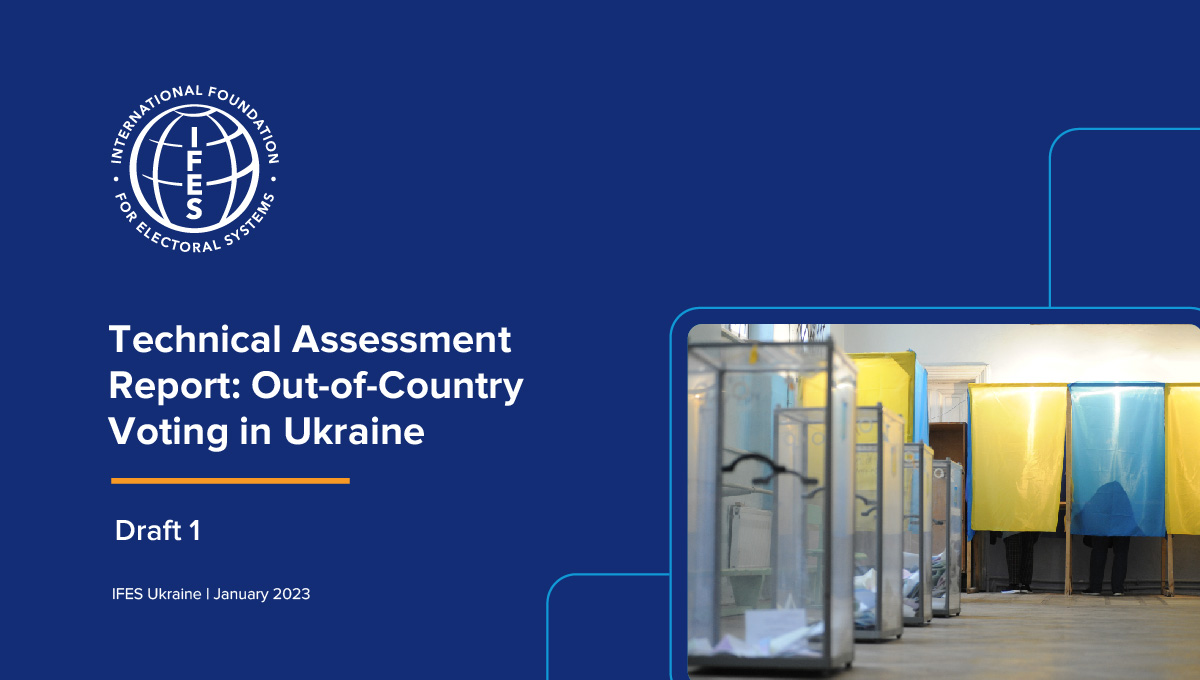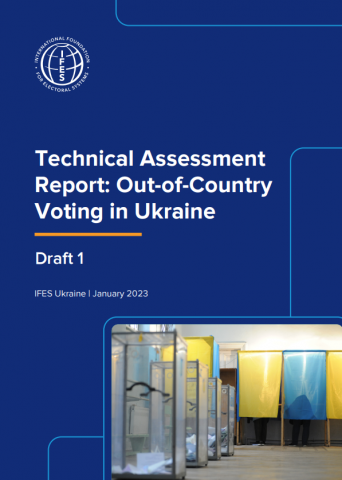Technical Assessment Report: Out-of-Country Voting in Ukraine

Technical Assessment Report: Out-of-Country Voting in Ukraine
Ukraine’s first post-war elections are likely to be the largest administrative, logistical, and operational challenges in the field of elections ever to be held on the European continent in recent history. Voters and election administrators face systemic challenges during out-of-country voting organized by Ukraine. The number of Ukrainian forced migrants will likely aggravate them during the first post-war elections as well as new challenges will arise. The technical assessment report suggests a row of recommendations deemed to improve some of the out-of-country election procedures.
The document also argues the need to diversify out-of-country voting mechanisms to enfranchise the maximum number of Ukrainian forced migrants. Each of the three alternative voting methods under review – extended (out-of-embassy) in-person voting, postal voting or I-voting – contributes to a greater or lesser extent to the implementation of some or other electoral principles.
Ukraine should carefully study each of the methods, including other countries’ experience in their implementation and administration, so as to choose the best option for full restoration of democratic development after the end of the war. To consider the most appropriate option(s), the report provides interested stakeholders with a comprehensive overview of all important aspects (especially challenging ones) of three alternatives to Ukrainian in-person in-embassy voting mechanism.
PUBLISHED:
May 2023

Download:
PDF – 1.26 Mb
MEET THE EXPERTS

Lead author: Anna Denis
Anna Denis is an international electoral expert based in Kyiv, Ukraine. Main fields of expertise are Election Operations, Training, Gender, and Strategic Planning. Anna possesses a Master’s Degree in Law and PhD in Philosophy. Anna was granted a state Honorary Diploma for protecting voting rights of citizens during 2020 Local Elections in Ukraine.
Co-authors:
Aysha Shujaat, Manuel Wally, Serhii Savelii, Bohdan Mokhonchuk, Pavlo Romaniuk
Peer-reviewers:
Alisa Shushkovska, Harald Jepsen, Liliya Makhynko, Denys Kovryzhenko, Bohdan Byrchenko
ABOUT RESEARCH
Methodology of the Technical Assessment
The IFES Ukraine technical assessment was designed to comprehensively analyze the process of organizing out-of-country voting in elections, so as to identify the main systemic and practical obstacles for the purpose of improving the process of out-of-country voting as a whole, as well as for preventing possible complications during the first post-war elections caused by the exponential increase in the number of voters abroad.
The main activities within the framework of the technical assessment included:
- the development of assessment tools, including questionnaires and interview scenarios;
- an analysis of the modern socio-political and demographic context through analyzing statistical data, literature and media;
- comparing international practices and their respective risks, costs, and benefits;
- a review of the current electoral legislation of Ukraine and existing challenges in the practice of organizing out-of-country voting;
- conducting face-to-face and online meetings with national and international electoral stakeholders;
In the course of the technical assessment IFES Ukraine met with the Central Election Commission, the Ministry of Foreign Affairs of Ukraine, the Ministry of Digital Transformation of Ukraine, the Public Joint Stock Company “Ukrposhta,” the Central Election Commission of the Republic of Moldova, the Ministry of Foreign Affairs and European Integration of the Republic of Moldova, the National Election Institute of Mexico, the Central Election Commission of the Republic of Bosnia and Herzegovina, and other interested stakeholders.
- writing a draft report based on the results of the technical assessment;
- presenting the draft report to the main interested stakeholders and collecting the feedback and input.
Before publishing IFES Ukraine presented the draft report and invited for comments the Central Election Commission, Ministry of Foreign Affairs of Ukraine, UNCHR Representative in Ukraine and IOM mission in Ukraine. Key findings were also presented to key electoral NGOs, independent experts and political parties.
Draft 1 of the report is based on the interviewees’ responses, statistics and legislation current as of September 2022 – January 2023. IFES Ukraine may revisit this draft at a later stage based on additional input and/or new information as necessary.
Contents
List of Acronyms
I. Executive Summary
II. Introduction: Justification of the Need for Technical Assessment
1. International Election Standards and Out-of-Country Voting
2. History of Implementation of Out-of-Country Voting by Ukraine
3. Systemic Challenges in Organizing Out-of-Country Voting by Ukraine
4. Impact of Russia’s Full-Scale War against Ukraine on Voters’ Displacement and Organization of Out-of-Country Voting
III. Overview of Ukraine’s Out-of-Country Voting Organization Procedures and Recommendations
5. Administering the Process of Out-of-Country Voting: Responsible Institutions and Coordination among Them
5.1. Current Legislation and Practical Challenges
5.2. Recommendations
6. Creating, Liquidating and Changing Boundaries of Out-of-Country Precincts
6.1. Current Legislation and Practical Challenges
6.2. Recommendations
7. Creation and Training of Out-of-Country Precinct Election Commissions and Referendum Commissions
7.1. Current Legislation and Practical Challenges
7.2. Recommendations
8. Out-of-Country Voter Registration and Voter Lists at Out-of-Country Election Precincts
8.1. Current Legislation and Practical Challenges
8.2. Recommendations
9. Transfer, Storage and Return of Confidential Election Materials Abroad
9.1. Current Legislation and Practical Challenges
9.2. Recommendations
10. Out-of-Country Campaigning
10.1. Current Legislation and Practical Challenges
10.2. Recommendations
11. Voter Education and Awareness and Combating Misinformation
11.1. Current Legislation and Practical Challenges
11.2. Recommendations
12. Conduct of Voting, Counting of Votes and Establishment of Voting Results
12.1. Current Legislation and Practical Challenges
12.2. Recommendations
13. Election Dispute Resolution
13.1. Current Legislation and Practical Challenges
13.2. Recommendations
14. Out-of-Country Observations
14.1. Current Legislation and Practical Challenges
14.2. Recommendations
IV. Options for Ukraine Postwar Out-of-Country Voting Reform
15. The Need for Reform
16. Out-of-Country Voter Registration Post-War
17. Expanded In-Person Voting Abroad
18. Postal Voting Abroad
19. Internet Voting Abroad
V. Conclusion

Download:
PDF – 1.26 Mb
